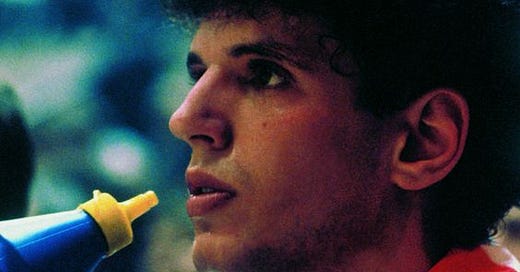Book-bliss: Top-tier basketball biographies
I am quite ignorant about basketball. All I know is that it is played by extremely tall people, and Americans and Balkan people seem to excel at it. I used to attend some matches at the Palasport in Varese, my hometown, because S., my friend, definitely had a type. She was like a serial killer and managed to get a job as a ticket checker to be close to those giants. And she is definitely short. I don’t know, maybe she suffers from Napoleon syndrome.
Lately, basketball has caught my attention because of Jokić. The guy is the quintessential Balkan man: unbothered, a fun lover, and honest to a fault. The fact that he seems to have no interest in replaying interviews about the NBA and would rather be at a party in Belgrade, drinking cheap beer and singing old songs in a bar with peers, endears him to me. It seems like he takes the NBA as a 9-to-5 job he has to do to finance his true passion, horse races.
Let’s start with a Balkan guy, one from Croatia, the country I try to steal tourists from every year.
“Drazen: The Remarkable Life and Legacy of the Mozart of Basketball” on Dražen Petrović.
This is the story of a guy born in Šibenik, Yugoslavia, a small town in present-day Croatia). He emerges not just as a basketball virtuoso but as a product of a rich and diverse heritage. The book emphasizes his humble beginnings, the son of a
a police officer father, Jovan "Jole" Petrović, hailing from a Serb family in Zagora, Bosnia and Herzegovina, and a devout Roman Catholic mother, Biserka, from Bilice, Šibenik. He reflects a fusion of cultures within the family that was so common before the Balkan wars.
His legacy is important because he is considered to be the one that opened the door of the NBA to European players. The book becomes a cultural journey, from Šibenik to the international stage, showcasing how Petrović's multifaceted identity influenced his approach to the game. He chose to play for the Croatian National team once the war was over. Which was not particularly easy to do emotionally speaking as he was second cousins to Serbian basketball player Dejan Bodiroga. The war also broke his friendship with a previous team member, Serbian Serbian/Yugoslav player Vlade Divac.
Sadly, he tragically died very young in a car accident in Germany but he has impacted his country so much in terms of hopes and dreams. In 2011, a statue of him as a little boy sitting on a bench with a ball was unveiled in his hometown, and his old room was renovated the way it looked when he was young, as the first part of the Memorial Center in his hometown.
Keep reading with a 7-day free trial
Subscribe to TheContraryMary to keep reading this post and get 7 days of free access to the full post archives.




